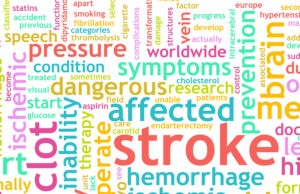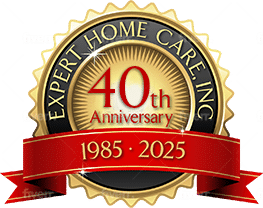Strokes are a leading cause of death and disability in the United States. Every year, approximately 795,000 people suffer a stroke. Of these, approximately 610,000 are first attacks and 185,000 are recurrent strokes. A stroke is a medical emergency. The sooner the senior suffering a stroke receives treatment, the better their chances of recovery. The key to stroke treatment is rapid diagnosis, 24-hour home care and treatment with medications that reduce the size of the stroke and limit the damage to the brain.
What are the Symptoms of a Stroke?

It is important to be able to recognize symptoms of a stroke. Many of the symptoms are similar to those of a heart attack, including:
- Sudden dizziness or vertigo
- Loss of balance or coordination
- Weakness or numbness in the face, arm or leg, especially on one side
- Confusion
- Loss of vision
- Sudden, severe headache
- Difficulty speaking
- Stroke Treatment
If you suspect that your senior is having a stroke, call 911 immediately. It is essential to keep the senior warm and comfortable and to keep them from moving around. If you are alone with the senior, gently move them to a more comfortable position and keep their head slightly tilted. The most important thing is to keep the senior in one place until medical help arrives.
If the senior is unconscious, they should be placed on their side. This reduces the risk of choking on their tongue and helps to prevent serious complications such as pneumonia.
When emergency medical personnel arrive, they will assess the senior and begin treatment. If the senior is having trouble breathing, they may need to perform CPR. The senior will then be taken to the hospital, where they will be given medication to reduce the size of the stroke and reduce the damage to the brain.
What is the Long-Term Outlook for Someone Who Suffers a Stroke?
The long-term prognosis after stroke depends on the severity of the stroke, the location of the stroke, and the amount of damage to the brain.
Most strokes are caused by a blockage of an artery in the brain, usually by a blood clot. This can be caused by a number of things, including high blood pressure, smoking, diabetes, and high cholesterol.
With prompt medical treatment, a senior who suffers a stroke can recover and lead a normal life. The extent of the damage is based on the extent of the stroke – a stroke can range from a relatively minor episode with no permanent damage to a severe stroke with total paralysis and loss of speech.
How to Prevent a Stroke?
The best way to prevent a stroke in seniors is to lower your blood pressure and cholesterol level. If they have high blood pressure, it is important to see a doctor regularly to keep your levels under control. Seniors who are at risk for stroke should undergo a medical workup to determine whether they have high blood pressure or cholesterol and then be placed on medication.
While lowering your blood pressure can help to reduce your risk of stroke, it is also important to avoid smoking, get plenty of exercise, and avoid unhealthy foods.
24-Hour Home Care can Assist with Safety
Strokes can happen to anyone but it is important to keep your senior safe and comfortable in all situations, 24-hour home care can help them with that! We provide the best care available to your senior. Give us a call today!
Sources: https://www.cdc.gov/stroke/facts
https://www.nhs.uk/conditions/stroke/
https://www.nhs.uk/conditions/stroke/symptoms/
https://www.ninds.nih.gov/Disorders/Patient-Caregiver-Education/Fact-Sheets/Post-Stroke-Rehabilitation-Fact-Sheet
If you or an aging loved-one is considering 24-Hour Home Care Services in Bridgewater NJ please contact the caring staff at Expert Home Care today at (732) 937-5320.
We have been providing Home Health Care to New Jersey families since 1985, and have grown to become one of the largest licensed providers of Live-In Home Care in the upper New Jersey area. Our many years of New Jersey home care experience has produced a company that over 8,000 clients have come to rely on confidently, for help.
- Risk Factors for Loneliness - April 22, 2025
- Common Challenges Seniors Face in Cars - April 7, 2025
- How Volunteering Can Help Your Senior Parent Find Purpose - March 24, 2025

